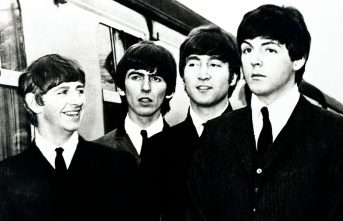As capitalism, and cities change? This can be seen in the Silicon Valley IT giants like Apple, Facebook and Google.
San Francisco: a homeless man with his belongings in a shopping cart in the Market Street photo: Reuters
The consequences of the current digitization, and automation will be extremely differing. While Aaron bast anise speaks in a surprisingly Tech-optimistic publication "Fully Automated Luxury Communism" from the middle to the end of capitalism and the liberation of the people in the automated communism recognizes, reported Katja Schwaller in your no less interesting collection of "Technopolis" of the current urban conflicts in the Metropolitan region San Francisco/Oakland/Silicon Valley.
In the 100-Kilometer-long Bay area the most expensive spots in the world, where even software engineers stay in the car and the dirty work have to travel long distances in crummy public transport, while the Google-drag buses passing you by. Recently, Tech companies like Twitter and Uber are discovering the advantage of the centre near settlements in San Francisco and to heat up the housing market further. A relief by compression is prevented here as selfish as legal.
Former gay neighborhoods, as well as niches for Hispanic and homeless people to be dispossessed, forced and Hyper-capitalist redistributed. Tech, Finance and real estate capitalism work Hand-in-Hand; it is the diet-conscious, hard-working and bleaching Tech-transferees benefit. For your life whole quarters of the city to be discursive as real turned inside out and re-formatted.
in this respect, it is no coincidence that at both Ends of the Google bus protests are on the rise and up in the canteens the is only for the Privileged Paradise-equipped Tech-property attracts. The all-round catering Campus for a means camping on the roadside for the other: "About one-sixth of the population in the San Francisco Bay Area lives in poverty or suffering from Hunger and health problems," the critical geographer Richard Walker.
Katja Schwaller (EDS.): "Technopolis. Urban battles in the San Francisco Bay Area“. Verlag assoziation A, Berlin/Hamburg in 2019, 232 pages, 19,80 Euro
Here is the "Silicon Valley Paradox" is not more study, that "a full-time job in one of the company's own cafeterias, where the most highly paid employees of the Tech industry get all the free-of-charge, sufficient to bring home enough food on the table". The ratio between the Techies and the service staff is reminiscent of southern slavery: "You are muddling along and always, while everything around you is swimming in Abundance. And it was always so,“ said the activist city, a researcher Ofelia Bello.
"The Bay Area is swimming in a whole stream of value-that is, around the world, and then of global corporations back to the metropolis region is pumped," writes Richard Walker. The Tech cruise ships from all around powered work, Living and leisure splitting your controlled urban anchorage.
With the invention of the silicone chip in the 1950s was the beginning of what was called the 1970's Lidyabet Silicon Valley. The Astronautical-military complex, as well as the computer-based Fantasy film industry is transported by means of a high state subsidies, the computer chip industry.
"state 'welfare' for companies," announced Katja Schwaller this comprehensive location policy. Today the Chinese pearl river Delta relocated factories, but areas for Internet-based "Ecosystems", as well as associated capital investors dominate the landscape.
A contribution in the book is the history of ethnic and racial displacement policy to
Urban Tech includes a whole range of ancillary industries: "The Tech-forest has [...] a dense undergrowth of support services," of law firms and management consultants, research companies to the real estate industry, says Richard Walker.
Swiss researcher and Translator Katja Schwaller together in their anthology of over a dozen articles on the subject of Bay Area, as well as views of Europe, looks on Protest murals and social projects, and in Interviews the political scene to get a word in. So the "Anti-Eviction Mapping Project" by means of data visualization, "Big Tech" makes visible and (in)tangible: How to recognize the "low-lying geography of lending and speculation", and what is the role of Airbnb, based in San Francisco and responsible for numerous Residential changes of use?
Which is actually to Report potholes imaginary Hotline for complaints about "impairments in the quality of life" is increasingly used by the police to incite against annoying coming people. Cynically, there is now a new App, so that the number of messages in the last few years, has nine times and to the increasing criminalization of poverty.
"We live in a time of one of our greatest cultural treasures – urbanity – is plundered," writes the Queer activist Sarah Schulman. The contribution of Rebecca Solnit the long story of ethnic and racial displacement policy in the Mission, the Castro or South of Market. The co-working Space Wework black people except for the reception or the Security only as a Hip-Hop star or a with Angela Davis on the Wallpaper present.
Against the Tech industry resistance is more broad; it is against the Amazon-HQ2 in New York, the comparatively small Google Campus, or the Amazon-Tower in Berlin. The "protest choreography" of the "flow cross-part of the area of fight" (Stefan Low-wage workers) against Google came out without a formal organization and in the ideal case, along the lines of conflict of globalization. In the Foreword to the global reach of the Technopolis is outlined up to the mines in the Südkongo or the sweat shop factories in southern China once.
Date Of Update: 16 November 2019, 17:00











